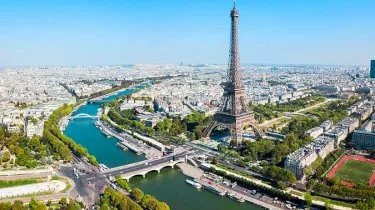Save
What are the top 10 most expensive cities in the world?
Logistical issues and currency fluctuations caused by the COVID-19 pandemic has seen the most expensive cities in the world drastically change, new research has revealed.
What are the top 10 most expensive cities in the world?
Logistical issues and currency fluctuations caused by the COVID-19 pandemic has seen the most expensive cities in the world drastically change, new research has revealed.

Paris and Zurich have joined Hong Kong in becoming the three most expensive cities in the world, according to the latest Cost of Living Index from the Economist Intelligence Unit (EIU).
The index compared the prices of 138 goods and services from some 130 cities in September 2020 and found that prices on average grew 0.3 per cent over the past year.
The European cities have leapfrogged over Singapore and Osaka, which tied with Hong Kong in the previous survey conducted in March.
The changes are due to the COVID-19 pandemic, which has seen prices fluctuate around the world.

Currency fluctuations due to the pandemic means destinations in Africa, the Americans and Eastern Europe became less expensive since March, while Western Europe, where the Euro has risen in value against the US dollar have seen price rises.
A mass exodus of foreign workers has seen Singapore fall to fourth in world rankings, while Osaka has fallen with Tel Aviv now tying for fifth place.
Geneva, New York City, Copenhagen and Los Angeles round out the top 10.
Sydney is now the 15th most expensive city, while London ranked 20th in the world.
Largest cost of living rises
While Paris and Zurich are the most expensive cities in the world, the biggest cost-of-living increases were in Tehran and Perth.
The index showed the cost-of-living in Perth increased compared with other major cities as the Western Australian capital climbed 12 places to 67th most expensive city in the world.
Only Tehran made a bigger leap up the ladder – climbing 27 rungs to 79th place due to the reduced supply of goods (and subsequent price increases) caused by US sanctions.
Costly cigarettes, cheap clothes
While the prices of packaged goods, such as coffee, cheese, rice and orange juice, rose across most cities in the latest worldwide cost of living survey, the average index for the food and grocery category remained flat.
Logistical challenges also affected prices, with shortages of goods such as toilet roll and pasta fuelling price rises in some categories.
Of the 10 categories covered by the report, tobacco and recreation saw the biggest price increases, while clothing prices have seen the steepest decline.
The mean index for tobacco reported the highest year-on-year increase for any non-durable goods.
All five Australian cities saw double-digit increases in the tobacco index.
About the author

About the author


Expenses
Navigate Black Friday safely: Essential tips for global shoppers
As the global retail landscape gears up for another round of Black Friday and Cyber Monday sales, consumers worldwide are being advised to proceed with caution. HSBC, one of the leading financial ...Read more

Expenses
Expert tips to secure your financial safety net
New Zealanders are known for their "she'll be right" attitude, but when it comes to handling unexpected bills, being prepared is crucial. Read more

Expenses
Australians continue to opt for free VPNs, ignoring potential privacy risks
Australians, alongside citizens of Sweden, South Korea, and Mexico, are increasingly choosing to use free Virtual Private Networks (VPNs), despite the potential threats to their privacy. Read more

Expenses
Rooftop solar in childcare centres could cut energy bills by millions
The analysis conducted by Parents for Climate has revealed that the installation of rooftop solar and batteries in early childhood education and care (ECEC) centres could lead to savings of up to $130 ...Read more

Expenses
Corporate Traveller identifies key strategies for business travel savings
Flight Centre Travel Group's Corporate Traveller, a premier service provider for managing SME travel, has shared several effective strategies that enabled their business clients to significantly ...Read more

Expenses
Price no longer the prime factor for energy bills
Many Australians are intrigued but unconvinced when it comes to greening their energy bill. Read more

Expenses
1 in 2 Aussie pet owners spends on their pets more than themselves
Does owning a pet eat into your monthly budget? You’re not alone. Read more

Expenses
The real reason Sydney’s petrol prices are so high
Sydney fuel prices may seem like they’re soaring, but a recent study indicates that they may be cheaper than you think. Read more

Expenses
Navigate Black Friday safely: Essential tips for global shoppers
As the global retail landscape gears up for another round of Black Friday and Cyber Monday sales, consumers worldwide are being advised to proceed with caution. HSBC, one of the leading financial ...Read more

Expenses
Expert tips to secure your financial safety net
New Zealanders are known for their "she'll be right" attitude, but when it comes to handling unexpected bills, being prepared is crucial. Read more

Expenses
Australians continue to opt for free VPNs, ignoring potential privacy risks
Australians, alongside citizens of Sweden, South Korea, and Mexico, are increasingly choosing to use free Virtual Private Networks (VPNs), despite the potential threats to their privacy. Read more

Expenses
Rooftop solar in childcare centres could cut energy bills by millions
The analysis conducted by Parents for Climate has revealed that the installation of rooftop solar and batteries in early childhood education and care (ECEC) centres could lead to savings of up to $130 ...Read more

Expenses
Corporate Traveller identifies key strategies for business travel savings
Flight Centre Travel Group's Corporate Traveller, a premier service provider for managing SME travel, has shared several effective strategies that enabled their business clients to significantly ...Read more

Expenses
Price no longer the prime factor for energy bills
Many Australians are intrigued but unconvinced when it comes to greening their energy bill. Read more

Expenses
1 in 2 Aussie pet owners spends on their pets more than themselves
Does owning a pet eat into your monthly budget? You’re not alone. Read more

Expenses
The real reason Sydney’s petrol prices are so high
Sydney fuel prices may seem like they’re soaring, but a recent study indicates that they may be cheaper than you think. Read more













